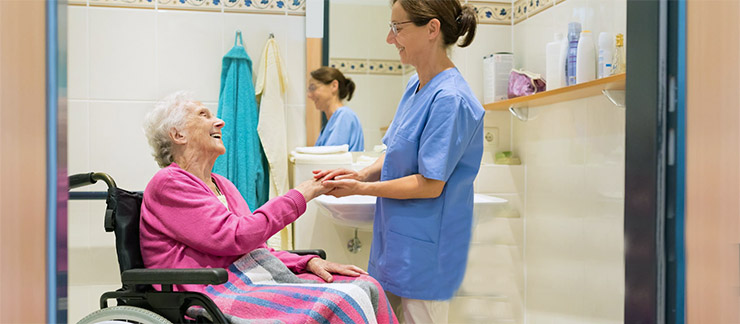
Supporting an Aging Parent with Bathroom Assistance
Aging seniors may encounter physical and cognitive issues that affect their ability to manage tasks around the home independently. Common issues include reduced mobility, muscle weakness, and balance problems, which can increase the risk of falls and injuries.
But what happens if your mom or dad needs help in the bathroom? How do you preserve privacy and dignity while helping them with toileting and bathing?
When your aging parent needs assistance in the bathroom, it's essential to handle the situation with patience, empathy, and understanding.
Fall Risks in the Bathroom
Falling is common and is the leading cause of death and injury in adults 65 and older. A hot zone for falling hazards is the bathroom, which is often slippery and cramped and can have loose objects, like unsecured bathmats. Getting in and out of the shower can cause slips and falls. In addition, seniors dealing with incontinence may rush to the bathroom, leaving them prone to tripping and injuries.
If you’ve noticed your aging parent is becoming unsteady on their feet or has had one or more falls recently, it may be time to seek professional home care assistance.
Related Reading: How a Home Care Agency Can Help Prevent Falls
Overcoming Embarrassment
Going to the bathroom is a personal, private experience. The subject of toileting assistance can be uncomfortable and embarrassing to broach, but it’s a necessary discussion. Your parent may not want to appear vulnerable, and it can be hard for you to see the person who raised you in that position.
Express to your parent that you don’t judge them for needing extra help and you’ll take steps to preserve their dignity. Discuss the risks of a potential fall and essential steps to avoid accidents.
Sometimes, seniors feel more comfortable getting personal in-home assistance from a care provider like Visiting Angels. Your parent may realize having professional help at home is preferable to moving to an assisted living facility or nursing home. An experienced caregiver can be on hand to address their basic needs and help them feel supported and less alone.
Offering Physical Help
If it’s unsafe for your mom or dad to use the bathroom alone, you or a professional caregiver may need to accompany them. Let your senior do as much as they can safely to make them feel more comfortable and independent.
Here are a few tips to help an aging parent in the bathroom:
- Don’t rush
It may be better to stay with your parent in the bathroom rather than walk away and return when they are finished. If they need help removing clothes, go slowly and encourage them to help. - Try wet wipes
If your loved one needs help wiping, wet wipes may be easier and more sanitary than toilet paper. Remind your parent not to flush the wipes to avoid clogs. - Assist with pulling up pants
Helping to pull up their pants can help them avoid tripping on loose clothing. Clothing with drawstrings or simple snaps will make using the bathroom easier. - Provide as much privacy and modesty as possible
Hold up a cover while they are undressing or place a towel on their lap while they are using the toilet. Make sure the towel doesn’t become a tripping hazard.
Diffusing the uncomfortable situation with a sense of humor can be essential in helping your senior use the toilet. Laughing with them—and not at them—can help release the tension and awkwardness.
Changing the Bathroom Setup
If using the bathroom is difficult for your parent, consider remodeling the area for accessibility. For example, walk-in showers with doors can provide easier entry than a traditional tub.
If a full remodel isn’t in the budget, you can make a big difference with simple updates such as:
- Installing grab bars to help your parent get on and off the toilet
- Adding nonslip decals to the shower or tub floor to minimize slip risk
- Securing loose bathmats and shower curtains to avoid tripping hazards
- Placing night lights or automatic lights in the bathroom and hallways to help your parent navigate the walkway
- Storing items such as toilet paper, wet wipes, and toiletries within reach and with minimal obstacles
Related Reading: 7 Bathroom Safety Tips to Prevent Falls and Injuries
Respectful Caregiver Support in the Bathroom
Your parent may maintain a regular bathroom schedule, but they could have urges at any time of the day or night, which means 24/7 care may be needed. Having a professional caregiver will allow you some time off while ensuring your loved one’s bathroom needs are adequately addressed. A professional caregiver can provide much-needed personal care, including using the toilet, changing clothes, and bathing.
Contact your local home care office to learn how Visiting Angels can support your senior. Schedule a free home care consultation today.
